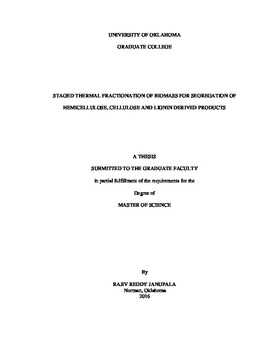| dc.contributor.advisor | Lobban, Lance | |
| dc.contributor.author | Janupala, Rajiv Reddy | |
| dc.date.accessioned | 2016-05-12T20:30:47Z | |
| dc.date.available | 2016-05-12T20:30:47Z | |
| dc.date.issued | 2016-05-14 | |
| dc.identifier.uri | https://hdl.handle.net/11244/34653 | |
| dc.description.abstract | The increasing industrialization and motorization of the world has led to a steep rise in the demand of petroleum-based fuels. However, negative environmental consequences of fossil fuels, natural limitation in their availability and growing concerns over the petroleum supplies has spurred the search for renewable and low carbon emission fuels. Lignocellulosic biomass is one of the most promising renewable and clean energy resources to reduce greenhouse gas emissions and human’s dependence on fossil fuels. Moreover, biomass is a continuous energy source and is considered carbon-neutral. Thermochemical conversion of lignocellulosic biomass has received increasing attention as a strategy to produce biofuels from lignocellulosic biomass. Additionally, different thermochemical technologies are being developed/modified so that they can be integrated into the current infrastructure associated with liquid hydrocarbon fuels. Fast pyrolysis of biomass is one of the promising thermochemical technology that produces high yields of bio-oil, but some of the unfavorable properties of bio-oil poses challenges in the development of technical- and cost-effective catalysts and operating processes for the upgrading of bio-oil.
In this contribution, we consider thermochemical conversion of oak biomass in multiple stages and understand how the process helps in achieving fractionation of bio-oil and facilitates combating some of the catalytic upgrading problems encountered during bio-oil upgrading. By characterizing the products obtained from each stage, as well as comparing the cumulative carbon yields of the products from stages with fast pyrolysis products carbon yields, further conclusion has been made with respect to the process conditions and potential upgrading strategies for each stage. | en_US |
| dc.language | en_US | en_US |
| dc.subject | Staged Thermal Fractionation of Biomass | en_US |
| dc.title | STAGED THERMAL FRACTIONATION OF BIOMASS FOR SEGREGATION OF HEMICELLULOSE, CELLULOSE AND LIGNIN DERIVED PRODUCTS | en_US |
| dc.contributor.committeeMember | Mallinson, Richard | |
| dc.contributor.committeeMember | Crossley, Steven | |
| dc.date.manuscript | 2016-05-12 | |
| dc.thesis.degree | Master of Science | en_US |
| ou.group | College of Engineering::School of Chemical, Biological and Materials Engineering | en_US |
